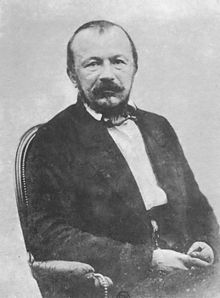By Lauren Peterson — While the number of topics in poetry is unlimited, poetry is commonly thought of as that which explores love and

loss. When poetry is brought up, one may be quick to think of Shakespearean love sonnets or Emily Dickinson’s poems on death. Yet, poets, including the two just mentioned, had much to say on religious matters. One lesser-known poet, coming after Shakespeare and before Dickinson, directly addressed religious liberty in his work.
After three mental breakdowns, including at least one in which he was hospitalized, French poet Gérard de Nerval published one of his lesser-known works: a mythological poem entitled “Delfica.” One year later, in 1855, he hung himself from his window grating, having been known as a man of ambiguity and mystery. His pet lobster, which he would take for walks with a blue ribbon, had added to this reputation. He was a son of a doctor who had served in Napoleon’s army, and his mother died while accompanying him when Nerval was a meager two years old. Nerval later had even attended some medical classes, supposedly in order to appease his father. Ridding himself of a painful history, he created a family ancestry of grandeur during his first mental breakdown: one which connected him not only to German royalty, but back even to the Roman emperor Nerva. His imaginative and constructive abilities reflect some of the better-known Romantic poets, such as William Blake, who created and worshiped his own deities. Nerval continued to construct, religiously this time, with “Delfica.” There is no need to brush up on Greek mythology if this name is not familiar: Nerval constructed it as he had constructed his own name. For those with the ability to comprehend French, Nerval’s poem gently while firmly consoles Daphne, letting her know that her gods have not abandoned her forever:
Delfica
La connais-tu, Dafné, cette ancienne romance,
Au pied du sycomore, ou sous les lauriers blancs,
Sous l’olivier, le myrte, ou les saules tremblants,
Cette chanson d’amour qui toujours recommence ?…
Reconnais-tu le Temple au péristyle immense,
Et les citrons amers où s’imprimaient tes dents,
Et la grotte, fatale aux hôtes imprudents,
Où du dragon vaincu dort l’antique semence ?…
Ils reviendront, ces Dieux que tu pleures toujours !
Le temps va ramener l’ordre des anciens jours ;
La terre a tressailli d’un souffle prophétique…
Cependant la sibylle au visage latin
Est endormie encor sous l’arc de Constantin
– Et rien n’a dérangé le sévère portique.
For those not fluent in French (including myself), a translation begins with a trot, which is as bad as it sounds. A trot is a word-by-word translation of a poem, and for this poem, sounds something like: “They will return, these Gods you cry forever!” making it sound as if the speaker denounces Daphne’s crying habits. The translator’s job is to then turn this back into Nerval’s poem, which means looking for the poem’s main ideas. Nerval cleverly uses symbols and imagery that have, like him, an ambiguous nature. They are symbols claimed by multiple religions. For instance, many lay claim to the olive tree as a symbol within their religion. Could the speaker be alluding to multiple religions at once? The speaker acknowledges that Daphne’s gods are presently absent, though. Yet, he claims they will return. It appears that the speaker argues that there is a time for all religions, as if they go through a cycle, which gives space for them all.
My translation emphasizes the idea of tolerating multiple religions while trying to maintain the same rhyme scheme:
Daphne, Nymph of Plants
after Gerard de Nerval’s “Delfica”
Do you know, Daphne, that old romantic song,
Beside the Fleur-de-lis, or the Lotus from afar,
Above by the wise owl, or by a crescent-enclosed star,
That passionate melody that continues to long?
Do you remember temples with their mighty columns,
The bitter lemon you bit with your teeth,
And the cavern that hides its visitors’ defeat,
Where the dead dragon’s seed waits to blossom?
These gods whom you cry over will come back,
Time will place the ancient days on track,
The earth shakes with the news of their return.
Yet, the prophet remains stoic
and continues to see Constantine as heroic
— and the pillars at the entrance remain firm.
Having first made it big with his translation of Goethe’s Faust, I would like to think that Nerval would encourage the translation of his own works, even if some aspects are lost in the move.
Even though Nerval’s suggestion that religions go in a cycle may seem bizarre, the questions that both his poem and lifestyle raise are fascinating. What if multiple religions do have a time and place to exist? Since the symbols he used are shared by many religions, could it mean that we have some things in common? His poem has the ability to encourage great conversations and his lifestyle reveals, among the importance of not pressuring a kid into medicine, that diversity adds great richness.
Lauren Peterson is a senior English major at Walla Walla University and is planning to attend medical school after her graduation in June. In addition to studying literature, Lauren enjoys making lattes for her friends, swimming laps, and spending time with her two adventurous kittens–Lewis and Clark.